Political killings, protests and controversial elections plague African nation of Mozambique
Issues of corruption, internal warfare and dubious governments have led rights groups to believe this embattled nation is “on the brink” of collapse.
World
Don't miss out on the headlines from World. Followed categories will be added to My News.
Amid the chaos of multiple wars across two different continents dominating the news cycle, it’s easy to forget the atrocities unfolding in some of the world’s underdeveloped nations.
Issues of corruption, internal warfare and dubious governments have long plagued African nations, but recent events unfolding in the eastern nation of Mozambique have led rights groups fearing the country is “on the brink”.
Throughout 2024, insurgent attacks have continued to drive widespread displacement of the civilian population, while critical security forces and international donors begin to pull out.
In June, Refugees International warned leaders of the deteriorating situation, saying that the region has become a breeding ground for extremism and escalating violence.
More than 70,000 people have been displaced this year, pushing the total number of displaced individuals to around 1 million.
The violence, orchestrated by ISIS-affiliated groups, has included beheadings, abductions, and sexual violence.
Despite efforts by Mozambican troops, partnered with Rwandan and South African Development Community (SADC) forces, the insurgents have maintained their deadly campaign to assert their beliefs.
But the situation is poised to get even worse as key allies abandon the nation.
With SADC troops set to withdraw by the end of July 2024 and other forces preparing to scale back, civilians in northern Mozambique may be left more vulnerable than ever.
Rwanda has pledged an additional 2,000 troops in a bilateral agreement with Mozambique, but questions remain about whether this will be enough to fill the looming security vacuum.
Internally displaced people (IDPs), many of whom have been forced to flee multiple times, are struggling with limited access to humanitarian aid.
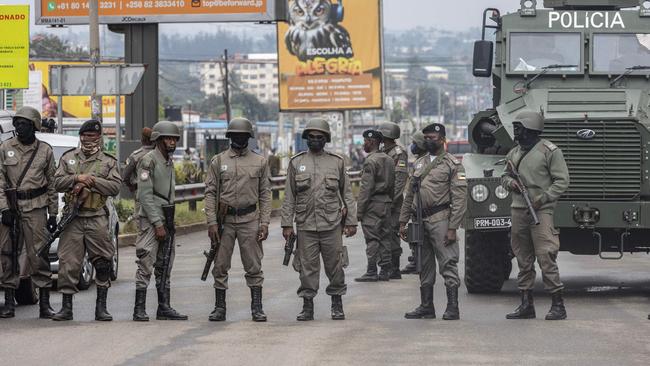
The United Nations Office for the Coordination of Humanitarian Affairs (OCHA) has issued an urgent appeal for $413 million in emergency assistance to support 2.3 million people across Cabo Delgado and Nampula provinces.
The UN Refugee Agency (UNHCR) reports that nearly 90 per cent of the displaced are women, people with disabilities, or the elderly, and more than half are children.
As the region continues to unravel, many IDPs face daily insecurity, local discrimination, and lack basic necessities such as food, clean water, and healthcare.
The crisis has also left countless children without access to education and separated families who fled with nothing but the clothes on their backs.
Political firestorm as party lawyer assassinated
Terrorism by religious groups are just the tip of the iceberg.
Mozambique saw a terrifying escalation of its political climate this week with the murder of Elvino Dias, a prominent lawyer and defender of opposition leader Venâncio Mondlane.
Mr Dias was shot dead in the capital city of Maputo alongside Paulo Guambe, an official from Mondlane’s political party Podemos.
Mr Dias, who was a fierce advocate for transparency and an instrumental figure in challenging the country’s electoral process, was gunned down just days after Mozambique’s contentious presidential election, in which Mondlane ran as an independent candidate backed by Podemos.
The attack, described as a “cold-blooded murder” by the Center for Democracy and Human Rights (CDD), involved 10 to 15 bullets, killing both men instantly.
The double assassination is being viewed as a brazen attempt to intimidate those calling for election transparency.
“They were brutally assassinated,” Nuvunga said, reflecting the growing concerns over political violence in Mozambique.
Election watchdog Mais Integridade echoed these fears, asserting that the assassination was clearly aimed at silencing voices demanding a fair electoral process.
Witnesses at the scene also accused local police of blocking an ambulance that arrived to assist the victims, further alleging that officers confiscated and destroyed phones to prevent the recording of the crime scene.
Those claims have been vehemently denied by the authorities.
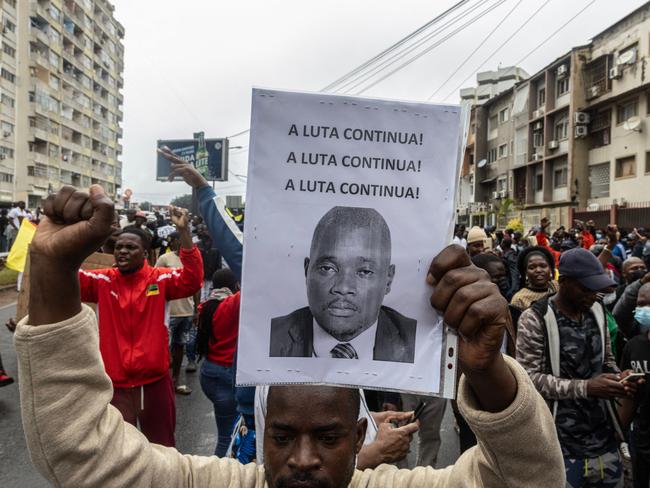
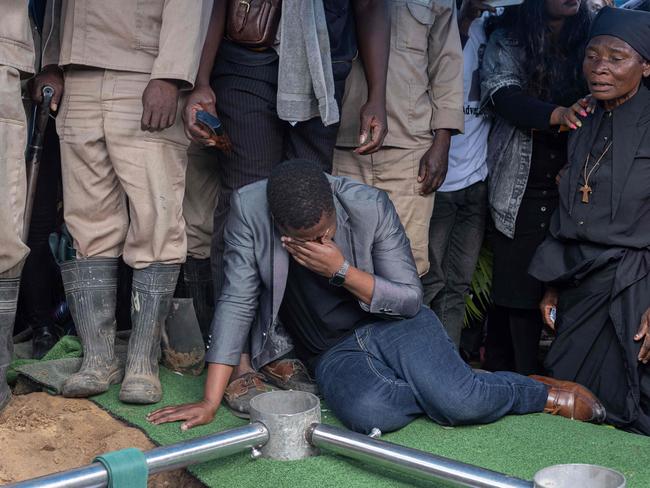
“We condemn the heinous crime and assure that we are taking all measures to clarify the case,” police spokesman Lionel Muchina said. Despite these assurances, the public remains sceptical, with fears that the killings are part of a broader campaign to stifle dissent as the vote count continues.
Mr Dias, celebrated by many as a relentless advocate for justice, had built a reputation for his tenacity in challenging Mozambique’s election commission.
“Elvino was a good, peaceful man,” Zenaido Machado of Human Rights Watch said. “He led several court cases against the election commission and won. This year, he was preparing to do it again.”
The timing of Mr Dias’ assassination could not be more explosive, as the country’s election results remain disputed.
Mr Mondlane, who has declared himself the rightful winner, continues to challenge claims that the ruling Frelimo party led by Daniel Chapo.
The embattled opposition leader called for a nationwide strike in protest, which went about as smoothly as you’d expect in a nation sitting on a knife’s edge.
Mondlane’s supporters clashed with police in the first round of major protests last week, leading to tear gas being used to disperse demonstrators in the capital.
In Nampula, three people were reportedly injured when security forces opened fire on protesters on October 17.
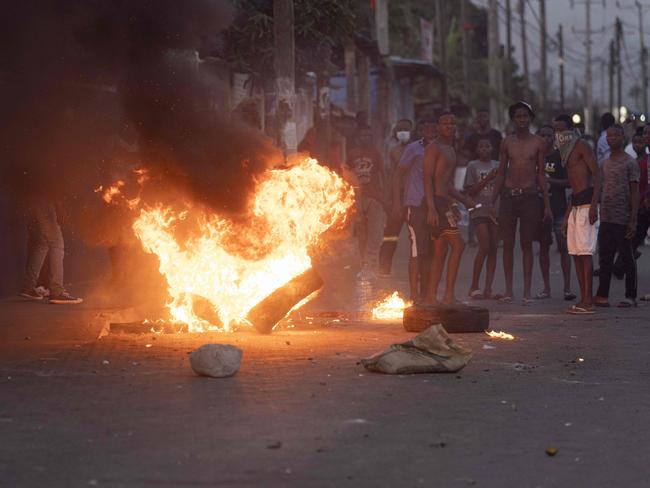
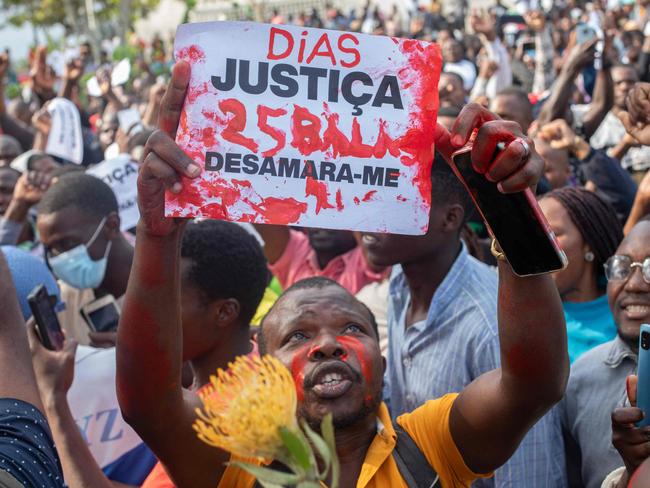
EU, US fire up over ‘outrageous crime’
The killings have sparked widespread international concern, with the European Union’s observer mission calling the incident an “outrageous crime”.
The EU has urged Mozambique’s government to launch an independent investigation, amidst broader concerns about the legitimacy of the election.
“These events follow worrying reports about violent dispersion of supporters in the aftermath of last week’s election,” the EU said in a statement.
Western observers, including the US-based International Republican Institute, have also raised alarms over vote-buying, inflated voter rolls in Frelimo strongholds, and voter intimidation.
The United States also condemned the killings and called for calm in the nation of 35 million.
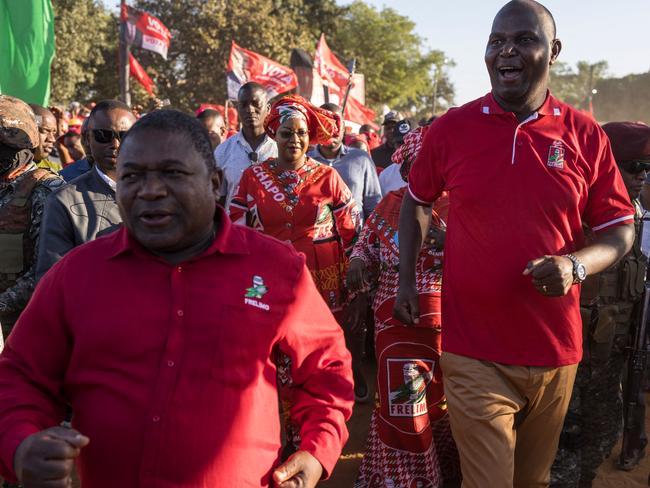
“The United States condemns the killings of lawyer Elvino Dias and Podemos parliamentary candidate Paulo Guambe in Mozambique,” US State Department spokesman Matthew Miller said in a statement.
“We join the calls made by all four of Mozambique’s national political parties in urging a swift and thorough investigation. Those responsible for these crimes must be held accountable.
“We urge all state institutions, political leaders, citizens and stakeholders to resolve electoral disputes peacefully and lawfully, rejecting violence and inflammatory rhetoric.”
Despite Mozambique’s vast natural resources, including rubies and gas, the country’s history of political violence continues to mar its democratic processes and will continue to present a headache for international peacekeeping organisations amid the unstable state of the world.
Originally published as Political killings, protests and controversial elections plague African nation of Mozambique



